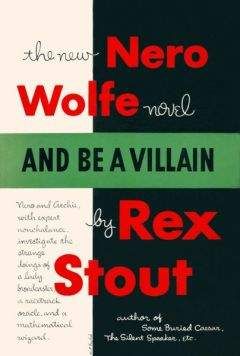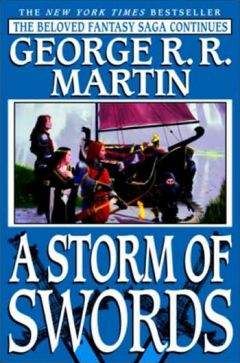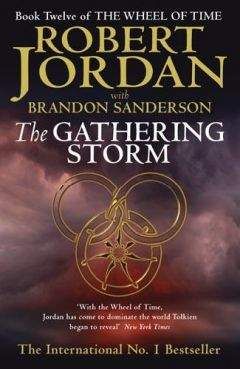“I told you-”
“I know. But that wasn't good enough. Examined with care, it was actually flimsy. I don't propose to recite all my twistings and windings for those twelve hours, but first of all I rejected the reason you gave. What, then? I considered every possible circum- stance and all conceivable combinations. That you were yourself the murderer and feared I might sniff you out; that you were not the murderer, but the blackmailer; that, yourself innocent, you knew the identity of one of the culprits, or both, and did not wish to be associated with the disclosure; and a thousand others. Upon each and all of my conjectures I brought to bear what I knew of you-your position, your record, your temperament, and your character. At the end only one supposition wholly satisfied me. I concluded that you had somehow become convinced that someone closely connected with that programme, which you were sponsoring, had committed the murders, and that there was a possibility that that fact would be discovered. More: I concluded that it was not Miss Koppel or Miss Vance or Mr Meadows or Mr Strong, and certainly not Mr Savarese. It is the public mind that you are anxious about, and in the public mind those people are quite insignificant. Miss Fraser is that programme, and that programme is Miss Fraser. It could only be her. You knew, or thought you knew, that Miss Fraser herself had killed Mr Orchard, and possibly Miss Poole too, and you were getting as far away from her as you could as quickly as you could. Your face tells me that you don't like that!”
“No,” Anderson said coldly, “and you won't either before you hear the last of it. You through?”
“Good heavens, no. I've barely started. As I say, I reached that conclusion, but it was nothing to crow about. What was I to do with it? I had a screw I could put on you, but it seemed unwise to be hasty about it, and I considered a trial of other expedients. I confess that the one I chose to begin with was feeble and even sleazy, but it was at breakfast this morning, before I had finished my coffee and got dressed, and Mr Goodwin was fidgety and I wanted to give him something to do. Also, I had already made a suggestion to Mr Cramer which was designed to give everyone the impression that there was evidence that Miss Vance had been blackmailed, that she was under acute suspicion, and that she might be charged with murder at any moment. There was a chance, I thought, that an imminent threat to Miss Vance, who is a personable young woman, might impel somebody to talk.”
“So you started that,” Elinor Vance said dully.
Wolfe nodded. “I'm not boasting about it. I've confessed it was worse than second-rate, but I thought Mr Cramer might as well try it; and this morning, before I was dressed, I could devise nothing better than for Mr Goodwin to type an anonymous letter about you and take it up there-a letter which implied that you had committed murder at least twice.”
“Goddam pretty,” Bill Meadows said.
“He didn't do it,” Elinor said.
“Yes, he did,” Wolfe disillusioned her. “He had it with him, but didn't get to use it. The death of Miss Koppel was responsible not only for that, but for other things as well-for instance, for this gathering. If I had acted swiftly and energetically on the conclusion I reached twenty-four hours ago, Miss Koppel might be alive now. I owe her an apology but I can't get it to her. What I can do is what I'm doing.”
Wolfe's eyes darted to Anderson and fastened there. “I’m going to put that screw on you, sir. I won't waste time appealing to you, in the name of justice or anything else, to tell me why you abruptly turned tail and scuttled. That would be futile. Instead, I'll tell you a homely little fact: Miss Fraser drank Starlite only the first few times it was served on her programme and then had to quit and substitute coffee. She had to quit because your product upset her stomach. It gave her a violent indigestion.”
“That's a lie,” Anderson said. “Another lie.”
“If it is, it won't last long. Miss Vance. Some things aren't as important as they once were. You heard what I said. Is it true?”
“Yes.”
“Mr Strong?”
“I don't think this-”
“Confound it, you're in the same room and the same chair! Is it true or not?”
“Yes.”
“Mr Meadows?”
“Yes.”
“That should be enough. So, Mr Anderson-”
“A put-up job,” the president sneered. “I left their damn’ programme.”
Wolfe shook his head. They're not missing you. They had their choice of sixteen offers. No, Mr Anderson, you're in a pickle. Blackmail revolts you, and you're being blackmailed. It is true that newspapers are reluctant to offend advertisers, but some of them couldn't possibly resist so picturesque an item as this, that the product Miss Fraser puffed so effectively to ten million people made her so ill that she didn't dare swallow a spoonful of it. Indeed yes, the papers will print it; and they'll get it in time for Monday morning.”
“You sonofabitch.” Anderson was holding. “They won't touch it. Will they Fred?”
But the director of public relations was frozen, speechless with horror.
“I think they will,” Wolfe persisted. “One will, I know. And open publication might be better than the sort of talk that would get around when once it's started. You know how rumours get distorted; fools would even say that it wasn't necessary to add anything to Starlite to poison Mr Orchard. Really, the blackmail potential of this is very high. And what do you have to do to stop it?
Something hideous and insupportable? Not at all. Merely tell me why you suddenly decided to scoot.”
Anderson looked at Owen, but Owen was gazing fixedly at Wolfe as at the embodiment of evil.
“It will be useless,” Wolfe said, “to try any dodge. I'm ready for you. I spent all day yesterday on this, and I doubt very much if I'll accept anything except what I have already specified: that someone or something had persuaded you that Miss Fraser herself was in.danger of being exposed as a murderer or a blackmailer. However, you can try.”
“I don't have to try.” He was a stubborn devil. “I told you yesterday. That was my reason then, and it's my reason now.”
“Oh, for God's sake!” Fred Owen wailed. “Oh, my God!”
“Goddam it,” Anderson blurted at him, CI gave my word! I'm sewed up! I promised!”
“To whom?” Wolfe snapped.
“All right,” Owen said bitterly, “keep your word and lose your shirt. This is ruin! This is dynamite!”
“To whom?” Wolfe persisted.
“I can't tell you, and I won't. That was part of the promise.”
“Indeed. Then that makes it simple.” Wolfe's eyes darted left. “Mr Meadows, a hypothetical question. If it was you to whom Mr Anderson gave the pledge that keeps him from speaking, do you now release him from it?”
“It wasn't me,” Bill said.
“I didn't ask you that. You know what a hypothetical question is. Please answer to the if. If it was you, do you release him?”
“Yes. I do.”
“Mr Traub, the same question. With that if, do you release him?”
“Yes.”
“Miss Vance? Do you?”
“Yes.”
“Mr Strong. Do you?”
Of course Tully Strong had had time, a full minute, to make up his mind what to say. He said it: “No!”
Chapter Twenty-Five Eleven pairs of eyes fastened on Tully Strong.
“Aha,” Wolfe muttered. He leaned back, sighed deep, and looked pleased.
“Remarkable!” a voice boomed. It was Professor Savarese. “So simple!”
If he expected to pull some of the eyes his way, he got cheated. They stayed on Strong.
“That was a piece of luck,” Wolfe said, “and I'm grateful for it. If I had started with you, Mr Strong, and got your no, the others might have made it not so simple.”
“I answered a hypothetical question,” Tully asserted, “and that's all. It doesn't mean anything.”
“Correct,” Wolfe agreed. “In logic, it doesn't. But I saw your face when you realized what was coming, the dilemma you would be confronted with in a matter of seconds, and that was enough. Do you now hope to retreat into logic?”
Tully just wasn't up to it. Not only had his face been enough when he saw it coming; it was still enough. The muscles around his thin tight lips quivered as he issued the command to let words through.
“I merely answered a hypothetical question,” was the best he could do. It was pathetic.
Wolfe sighed again. “Well, I suppose I'll have to light it for you. I don't blame you, sir, for being obstinate about it, since it may be assumed that you have behaved badly. I don't mean your withholding information from the police; most people do that, and often for reasons much shoddier than yours. I mean your behaviour to your employers. Since you are paid by the eight sponsors jointly your loyalty to them is indivisible; but you did not warn all of them that Miss Fraser was, or might be, headed for disgrace and disaster, and that therefore they had better clear out; apparently you confined it to Mr Anderson. For value received or to be received, I presume-a good job?”
Wolfe shrugged. “But now it's all up.” His eyes moved. “By the way, Archie, since Mr Strong will soon be telling us how he knew it was Miss Fraser, you'd better take a look. She's capable of anything, and she's as deft as a bear's tongue. Look in her bag.”
Cramer was on his feet. “I’m not going-”
“I didn't ask you,” Wolfe snapped. “Confound it, don't you see how ticklish this is? I'm quite aware I've got no evidence yet, but I'm not going to have that woman displaying her extraordinary dexterity in my office. Archie?”
I had left my chair and stepped to the other end of Wolfe's desk, but I was in a rather embarrassing position. I am not incapable of using force on a woman, since after all men have never found anything else to use on them with any great success when it comes right down to it, but Wolfe had by no means worked up to a point where the audience was with me. And when I extended a hand toward the handsome leather bag in Madeline Fraser's lap, she gave me the full force of her grey-green eyes and told me distinctly: “Don't touch me.”
I brought the hand back. Her eyes went to Wolfe: “Don't you think it's about time I said something? Wouldn't it look better?”
“No.” Wolfe met her gaze. “I'd advise you to wait, madam. All you can give us now is a denial, and of course we'll stipulate that. What else can you say?”
“I wouldn't bother with a denial,” she said scornfully. “But it seems stupid for me to sit here and let this go on indefinitely.”
“Not at all.” Wolfe leaned toward her. “Let me assure you of one thing, Miss Fraser, most earnestly. It is highly unlikely, whatever you say or do from now on, that I shall ever think you stupid. I am too well convinced of the contrary.
Not even if Mr Goodwin opens your bag and finds in it the gun with which Miss Poole was shot.”
“He isn't going to open it.”
She seemed to know what she was talking about. I glanced at Inspector Cramer, but the big stiff wasn't ready to move a finger. I picked up the little table that was always there by the arm of the red leather chair, and moved it over to the wall, went and brought one of the small yellow chairs, and sat, so close to Madeline Fraser that if we had spread elbows they would have touched. That meant no more notes, but Wolfe couldn't have everything. As I sat down by her, putting in motion the air that had been there undisturbed, I got a faint whiff of a spicy perfume, and my imagination must have been pretty active because I was reminded of the odour that had reached me that day in her apartment, from the breath of Deborah Koppel as I tried to get her on to the divan before she collapsed. It wasn't the same at all except in my fancy. I asked Wolfe: “This will do. Won't it?”



